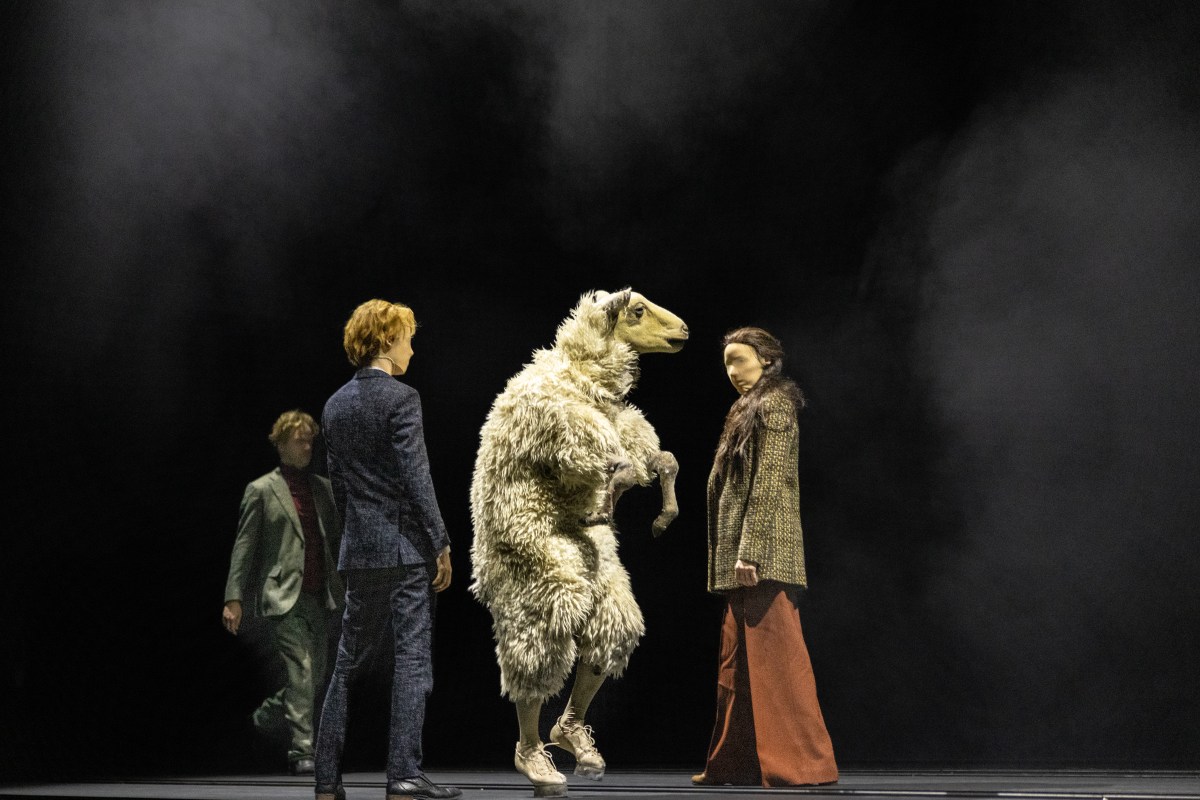Since biblical times, shepherds have tended their flocks in demanding, isolated environments. They work alone, caring for their sheep, as the sheep do for their lambs, day and night, through all seasons. The devotion is so deep that one may morph into the other as the imagination plays tricks with the isolation.
This show began with a large bell being rung by a person with a head completely covered by a red scarf. He wore white see-through tights as he danced freely, across a dark, misty stage. The bell is traditionally associated with a call to church to which humans will flock, as they did into the theatre, this time to witness the transformation of an animal that has served them so well, into a human being. There was no prelude with a description of what was about to unfold.
The play demanded an acceptance of a different concept of traditional theatre. There were no words spoken and the people involved wore masks. They simply moved along one of two conveyor belts that crossed the stage from one side to another, symbolic of our transition through life. There was a dark backdrop but nothing else to detract from the movements of figures and the presence of the protagonist.
Quiet enveloped the darkened theatre till a faint tapping accompanied the gradual appearance of 15 live sheep. They moved as one, nibbling some grain on the stage. They were lulled by gentle music played on a banjo by a man in shepherd’s garb, seated in a corner of the stage (Frederik Leroux-Roels). There was a slight intake of breath from the audience, but no noise, no claps or laughs. The reverence these docile animals engendered was palpable.
One sheep appeared to be struggling. Lighting by Ken Hioco focused now on a magnificent, tall creature, with a dignified sheep’s head, staring into the darkness and moving along the conveyor belt. Any further revelations of the proceedings would prevent audiences from becoming immersed in the performance. This is not what FC Bergman, a Belgian Theatre Collective, wants. The aim is for audiences to discover the meaning they feel comfortable with and ‘take responsibility for’. The Collective feels that a preconceived idea takes away the element of surprise and the ingredient that is crucial to our ability to explore the unknown, our curiosity.
The emphasis does not rely on ‘acting’ but credit must be given to Titus De Voogdt, who gave a magnificent interpretation as the Sheep.
The Sheep Song is the last in a series of plays by the Collective, which was founded in 2008 and won the prestigious Silver Lion for Theatre at the Biennale di Venezia.
This was no simple, straightforward performance. You may come out of the theatre in a state of confusion, but I feel I can say, confidently, that the fog will eventually lift and a meaning become clear.
Read: Music review: Lorde, Adelaide Festival
The originality of The Sheep Song is a giant step forward in live theatre, which explains why it has been presented regularly, in other parts of the world. The three performances in Adelaide sold out from the start and deservedly.
As for the well-being of the ‘flock’, I was reassured by the veterinarian that they were well cared for and enjoyed their moment of stardom.
Dunston Playhouse, Adelaide
Production: FC Bergman/Toneelhuis
By: Jonas Vermuelen, Stef Aerts, Joé Agemans, Thomas Verstraeten, Marie Vinck, Matteo Simoni
With: Stef Aerts, Bart Hollanders, Titus De Voogdt, Marie Vinck, Matteo Simoni, Yorrith De Bakker
Lighting Design: Ken Hioco
Sound Design: Senjan Janssen
Costume Design: Joëlle Meerbergen
Music: Frederik Leroux-Rouels
Co-production: Holland Festival, Les Théâtres de la Ville de Luxembourg, Piccolo Teatro di Milano – Teatro d’Europa
The Sheep Song was performed from 16-19 March 2023 as part of Adelaide Festival.





